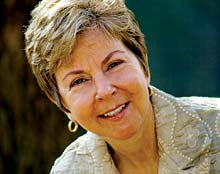Whatever your line of work, you’ve probably been forced to attend a company retreat at some point. And too often, they’re events to be endured rather than genuinely enjoyed.

Whether it’s dry speeches or fire-walking or irritating role-playing skits, it doesn’t necessarily reinvigorate participants’ approach to their work.
Marla Chalnick aims to change that.
It could have something to do with her background: Chalnick is trained to get inside your head.
Chalnick, who moved to Asheville two years ago from Charlotte, is a licensed professional counselor and a diplomate of the American Board of Medical Psychotherapists. Beginning her career more than 25 years ago as a special-education teacher working with children with emotional and behavioral problems, she holds a master’s degree in special education from Lesley University in Massachusetts.
After several years in the classroom, Chalnick moved into community mental health, focusing on developmentally challenged children and their families. She went on to earn a doctorate in human development and family studies at UNC-Greensboro.
Since establishing her private psychotherapy practice in 1995, her goal has been to offer her clients “a vision for change that will guide them to a more harmonious life.” That, she believes, should include their work. So for the past several years, Chalnick has been working largely with nonprofits, drawing on her psychotherapy background to make retreats more enjoyable and beneficial.
It began very informally, as Chalnick started doing pro bono work with various nonprofit groups. Then, Marla and her husband, Leonard Chalnick, a lawyer and CPA, began brainstorming ways to use her skills to help his clients—mostly small, family-owned businesses.
“When you work with small businesses, they’re like dysfunctional families,” she says. “So together we developed a way … to help them not only with the dysfunction of their business but also the dysfunction of their families—because if you can’t do both, they can’t grow.”
After the couple moved to Asheville, a call from a friend who was the head of a Jewish school in Charlotte pointed toward the next step.
“She said: ‘I’d like to try something with my teachers. Are you game?’” Chalnick recalls, adding, “She knew I was a big risk-taker.” What the headmaster wanted was a “forward-looking,” nontraditional retreat focused on team building.
So, digging into her psychotherapy tool kit, Chalnick decided to try an approach called “appreciative inquiry,” which tries to identify what’s best in people, their organizations and the world around them. Appreciative inquiry seeks to discover what animates a living system (which can be a corporation or organization) when it’s most alive, most effective and most capable—in economic, environmental and human terms.
“It really focuses on what are your dreams, what are your visions as an organization,” Chalnick explains. “It’s like the Barack Obama approach to retreats—it really comes from the bottom up, and typically when you go to a retreat it comes from the top down. This is completely opposite. It’s really a grass-roots kind of approach.” So instead of a vision shaped solely by the school’s head, the 30 teachers would play the pivotal roles.
First, Chalnick had each teacher write a personal mission statement and gave the group a brief tutorial on appreciative inquiry. The key message to teachers: “The language we use creates our reality,” says Chalnick. “It’s all about the self-talk that people use to damage themselves. Well, organizations do the same thing. An organization is nothing more than a multiple of individuals.”
Next, the teachers had to interview one another to determine when and where they felt most effective and engaged in their work. “Basically, what do you value most about yourself, your work and your organization, and what makes that possible?” she says.
“You got the flavor of what it was about this working environment that made it so positive,” says Chalnick. Yet another exercise delved into working relationships, emphasizing trust and respect—how they’re gained and how they’re communicated.
For homework, the teachers were asked to write down three wishes for the school’s future. After these were reviewed, the teachers were assigned to “dream teams” where they shared their wishes and then came up with a collective dream for the group—whether realistic or not. “If we could capitalize on the very best you have to offer, what would it look like?”
Next, the teachers had to express each team’s dream, whether through a song, a cheer or a picture. “I don’t care what you do,” Chalnick told them. “I just want you to use the other side of your brain. Go for it—you have until lunch.”
When these presentations were given after lunch, “I was amazed,” Chalnick relates. “Some of the stuff they came up with was unbelievable. Some of it was visual, some of it was auditory. … They used their senses, which is what I wanted them to do. … I wanted them to see that working together as a group, you’ve got to use all the parts that you have. You have to use everything to express how you can be the best you can be.”
But hold on a minute. Isn’t this suspiciously similar to the more typical peppy, exercise-driven retreats?
No, says Chalnick, because no one was required to participate. Everyone did, however, and the retreat was such a success that the principal had the teachers make the same presentations to the school’s board. “That was very gratifying to me,” notes Chalnick.
The key, she says, is knowing your room. Nearly everyone at the school was happy in their job, and the exercises were greeted positively. But what works with one group may not be effective with another—which leads to another thing that Chalnick feels sets her retreats apart from others.
“I don’t have canned stuff,” she explains. “Each one is always a new experience.”



Visit Marla Chalnick’s website:
http://www.therapywithmarla.com